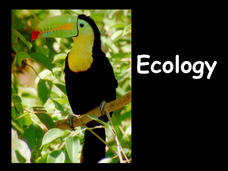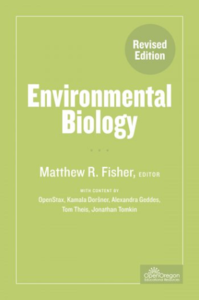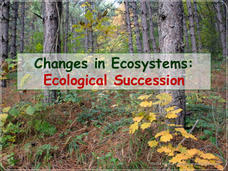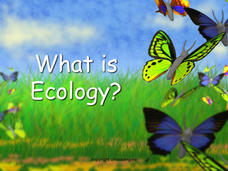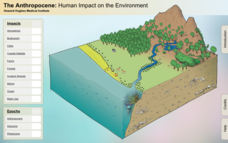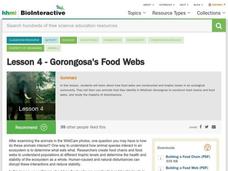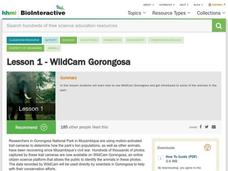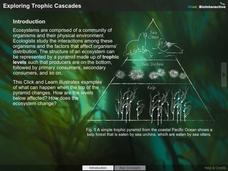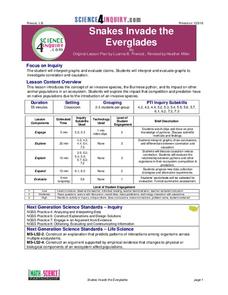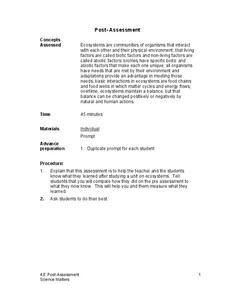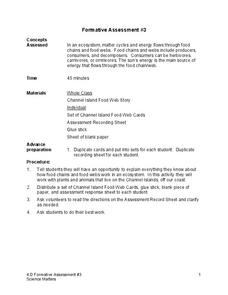Biology Junction
Ecology
Psychologists study human relationships while ecologist study relationships between organisms in the environment. An introduction to ecology and the related vocabulary benefits scholars as they progress through the presentation and...
Biology Junction
Energy Flow in an Ecosystem
Every living thing requires a food source, thus the interconnections in ecosystems become complex. Scholars learn about these interconnections in a presentation on energy flow. It starts with the sun and moves through many different...
Open Oregon Educational Resources
Environmental Biology
Everyone has a responsibility to take care of the environment. Give learners a sense of our environmental concerns with a complete course on environmental biology. The textbook resource includes instruction on topics such as population...
Biology Junction
Changes in Ecosystems: Ecological Succession
Can an area with no soil turn into a forest? Scholars learn about the process of ecological succession using an interesting presentation. It covers both primary and secondary succession in the building of new ecosystems.
Biology Junction
What Is Ecology?
Do you know the name for the biological study of interactions? A short presentation with accompanying worksheet introduces individuals to ecology. The materials offer a broad overview of the subject and the levels of organization to...
Biology Junction
Energy Flow Through an Ecosystem: Food Chains, Food Webs, and Energy Pyramids
When a minnow eats a piece of plastic, that garbage often tracks through multiple animals, causing harm to each as it passes through the food chain. Scholars learn about food chains, food webs, and energy pyramids with a presentation. It...
PBS
The Lorax
Accompany a reading of Dr. Seuss' tale, The Lorax, with a five-item learning exercise. Questions challenge scholars to list characters' names, use text details to answer inquiries, and describe the moral of the story.
WolfQuest
The Return of Gray Wolves to Yellowstone National Park: Right or Wrong?
Should gray wolves be removed from Yellowstone National Park? After researching the complex relationships between the various habitats and species at Yellowstone National Park, including humans, class members take a position...
Alliance Theater
The Jungle Book Post-Show STEAM Lesson
An ecosystem is really just the flow of energy through many different living organisms. A study of Rudyard Kipling's The Jungle Book leads to an environmental science activity in which learners study how various factors can affect...
Montana State University
Everest Extremes: Biodiversity
How many animals can live in a climate as cold as Mount Everest's? Find out with a science lesson all about biodiversity. Activities include research, presentations, group work, coloring maps, and a simulation of a food web.
Howard Hughes Medical Institute
The Anthropocene: Human Impact on the Environment
Will human existence define an epoch? Many scientists think we are in a new epoch, the anthropocene, defined by humans and our impact on the environment. An online interactive demonstrates the immense impact humans have had on every part...
Howard Hughes Medical Institute
Lesson 4: Gorongosa's Food Webs
Who eats who in the savannas of Africa? Explore trophic levels with part four of an eight-part series of lessons focused around Gorongosa National Park. After young explorers identify animals using trailcam images, they construct a food...
Howard Hughes Medical Institute
Lesson 2: Gorongosa National Park
How has Gorongosa National Park changed over time? Discover the park's rich history, dating back to primitive human times, through an interactive timeline and scientific reading. The second installment in an eight-part series explores...
Howard Hughes Medical Institute
Lesson 1: WildCam Gorongosa
Take a walk on the wild side! Episode one of an eight-part series of interactive lessons regarding Gorongosa National Park invites learners to become a part of the citizen science community. Scholars read a brief overview of the trail...
Howard Hughes Medical Institute
Measuring Biodiversity in Gorongosa
Take your biology class' understanding of biodiversity to a whole new level! Ecology scholars use data to calculate three different diversity indices based on the organisms in the Gorongosa National Park. The four-part activity uses an...
Howard Hughes Medical Institute
Building Ecological Pyramids
Looking for a fresh take on traditional food/energy pyramids? Conduct an innovative activity where pupils build their own! The lesson uses research data from Gorongosa National Park in Mozambique for a real-life safari touch. Scholars...
Howard Hughes Medical Institute
Niche Partitioning Activity
Dinnertime on the African savanna is a highly choreographed event! Introduce young ecologists to the concept of niche partitioning through a hands-on activity. Pupils research animal behaviors and use data to develop an understanding of...
Howard Hughes Medical Institute
Exploring Trophic Cascades
What happens when the top predator on an ecosystem disappears? Scholars explore this idea through an introduction example and four case studies. They learn to analyze the importance of every member in a food pyramid to come to their...
Science 4 Inquiry
Snakes in the Everglades
The Burmese python is on the loose ... and he's hungry! Illustrate the differences between causative and correlative relationships through an inquiry lesson. Pupils examine several sources of information to determine if there is a...
Science Matters
Post-Assessment
Twenty questions make up an assessment designed to test super scientists' knowledge of ecosystems. Scholars answer multiple-choice and short-answer questions about organisms, food chains, energy flow, and more.
Science Matters
That’s An Otter Story
Young scientists discover how sea otters' habitats have changed due to human impact. Through conversation, video observation, and story reading, scholars identify how human interactions change a specific ecosystem in both positive and...
Science Matters
Formative Assessment #3
Thirteen short-answer questions follow a brief food web activity in a formative assessment designed to test knowledge of ecosystems and the energy that flows through them.
Science Matters
Energy Flow
Budding scientists work collaboratively to reenact energy flow in a food chain. Scholars take on roles such as producer and consumer and perform tasks that symbolize energy flow in order to provide evidence of how much energy passes...
Science Matters
Crawly Composters
Get your hands dirty with an interactive instructional activity that showcases the process of decomposing and returning nutrients back into the soil. After building a compost pile, pupils regularly observe the...


